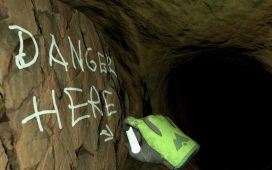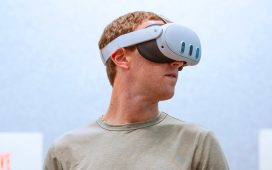
Valve officially released a feature to the SteamVR stable branch that adds basic hand-tracking to Steam Link for Quest users.
Previously only available in the Beta test branch released back in August, the new SteamVR 2.8 update doesn’t actually bring full hand-tracking support to SteamVR’s UI, but rather allows Quest users to DIY their setup for each game by experimenting with input bindings.
To enable hand-tracking through Steam Link, make sure both SteamVR and the Steam Link app for Quest is updated and head into the Binding UI in SteamVR’s Controller Settings to toggle on hand-tracking. From there, simply tap your controllers together and you’ll be able to start experimenting.
Valve says in the SteamVR 2.8 release notes (seen below) that the update also comes along with a number of bug fixes and quality of life improvements across SteamVR, Valve’s OpenXR API, and Steam Link for Quest, such as improvements to overall 2D and 3D streaming stability via Steam Link.
“We continue to focus on OpenXR as our preferred API for new games and applications,” Valve says. “SteamVR’s official OpenXR subforum is here and we’d love to hear your feedback, as well as suggestions for new features.”
Valve hasn’t said as much, however Steam Link probably won’t service just Quest. While Steam’s latest hardware survey indicates that over half of connected VR headsets are some flavor of Quest, its continued work on Steam Link may be a key to the rollout of its own rumored standalone headset, codenamed ‘Deckard’, which has been a hot topic of conversation since 2021 following a series of code leaks.
Continued references to Deckard in SteamVR and various patent filings have fueled further speculation that Valve is indeed exploring a standalone headset to compete with devices like Meta’s Quest lineup, which would make Steam Link an important utility.
Check out the full SteamVR 2.8 release notes below:
SteamVR
- Dashboard Grab Handles have a new movement model that includes accelerated movement towards and away from the user. The acceleration factor can currently be adjusted in the dashboard settings tab. The dashboard settings tab is hidden by default; select Show Advanced Settings in the lower left to unhide.
- The controls for desktop windows have been restyled.
- Allow Tundra trackers to bind to left and right ankle roles.
- Fixed the SteamVR settings page crashing if drivers attempt to show settings on the page before an HMD connects.
- Curl data from GetSkeletalSummaryData will now report 0.0 (rather than 1.0) if fingers are hyperextended.
- Improved behavior with very low FPS scene apps on non-native headsets (Quest, Steam Link, Virtual Desktop, etc)
- Fixed workshop bindings not displaying for popular titles that had changed input systems.
- Fix black screen bug for Pico users using Virtual Desktop on some games.
OpenXR
- Fix inconsistencies in xrLocateViews when switching between stage and local space.
- Fix bindings for left_ankle and right_ankle in XR_HTCX_vive_tracker_interaction.
- Fix non-base projection layers displaying in the wrong space.
Steam Link
- Enable hand-tracking pass through for SteamVR Input and XR_EXT_hand_tracking.
- Eye gaze information may be passed through OpenXR via XR_EXT_eye_gaze_interaction if enabled in the Steam Link settings. Note: Any users who previously had the “Share eye tracking data to other apps on this PC via OSC” option enabled, they will need to enable “Share eye tracking data to other apps on this PC” in Steam Link settings, and it will enable eye tracking data sharing both for OpenXR and OSC (if enabled).
- Improved 2D/3D VR Steam Link behavior.
- Fix image binding locations in binding UI for hand tracking controllers.
- Updates to SteamVR for Steam Link use with Quest 3S, fixing AMD users and improving experience for NVIDIA users.












